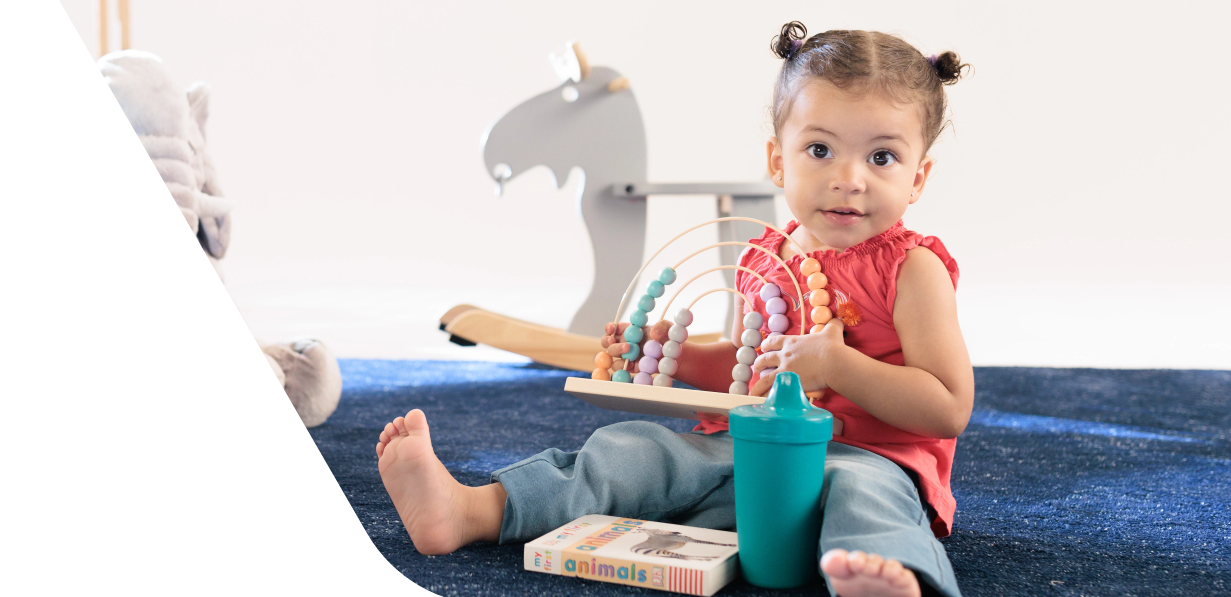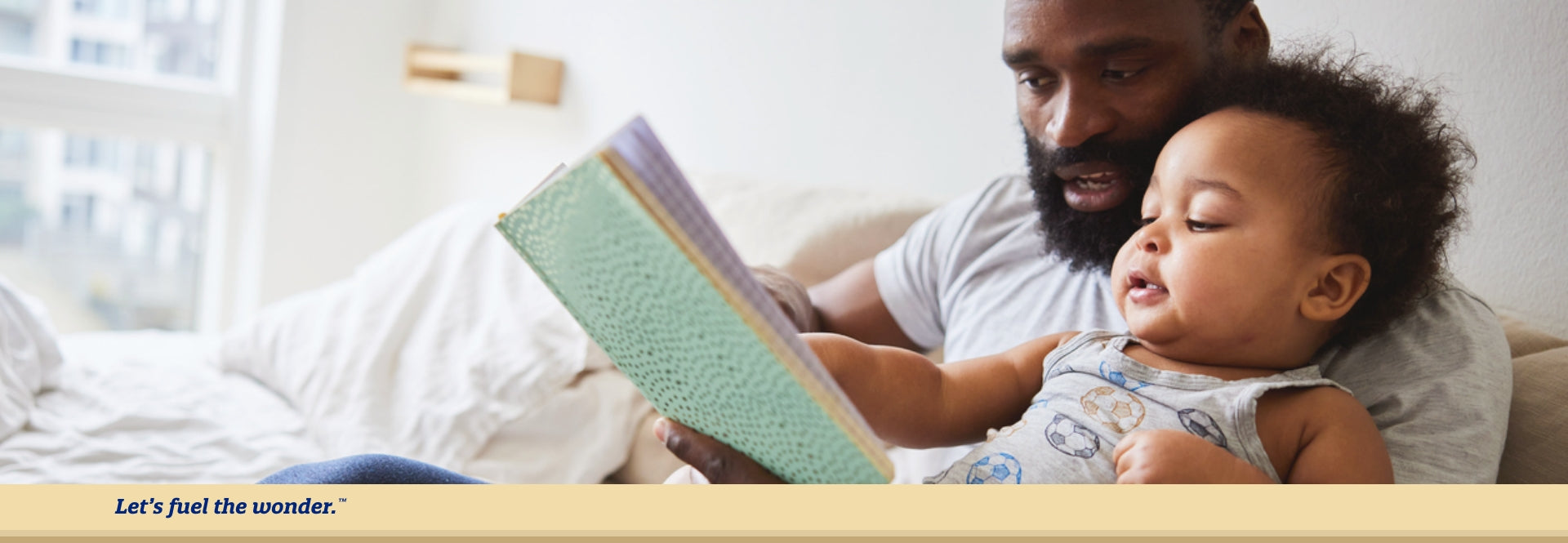Baby Milestones
Babies kickstart their development milestones early1, seemingly almost as soon as they leave the womb. Many of these physical and developmental milestones happen in the first year of life.
Physical
Milestones
Infants’ physical milestones can form the foundation of their movement throughout life. Feats such as the first smile, recognizing faces, grasping objects, or mastering the art of rolling over, sitting up, and crawling are all building blocks for how capable they may be in later years. It’s important to remember that reaching these milestones is what counts, even if they’re achieved slightly behind schedule.2
Communication and
Language Development
Babies are sometimes said to have their own language. By the time they are 4 months old they communicate in gurgles, babbles, coos, and a multitude of other sounds.3 The ability to use all these sounds, and recognize real words can set the stage for their early language development.
Cognitive
Development
Cognitive milestones help a baby to learn and understand their environment. These include such things as recognizing familiar faces, learning cause and effect, and exhibiting early problem-solving skills.4
The Dynamic Phase of Toddler Milestones
As babies grow into the little whirlwinds that are toddlers, their milestones seem to get as big as their personalities. It can be an exhilarating time for parents or caregivers to watch their tiny bundles become miniature real people.
Motor Skills and
Physical Development
Toddler’s motor skills develop incredibly fast. From taking their first wobbly steps to being able to run and climb, their physical development accelerates rapidly during this stage.5
Communication
and Language Leaps
After the babbles and coos come simple words, then basic sentence and more advanced language skills. Your little one is beginning to make their thoughts and feelings known clearly for the first time. During these first few months to years, their language abilities take a significant leap, aiding them in their understanding of the world around them.5
Social and
Emotional Growth
Your toddler also goes through notable social and emotional milestones during these formative years. This is when they start displaying early signs of empathy, forming friendships, and discovering their own emotions and those of others.6
Baby and Toddler Milestone FAQs
Babies kickstart their development milestones early1, seemingly almost as soon as they leave the womb. Many of these physical and developmental milestones happen in the first year of life.
What are the typical milestones in a baby’s first year?
In the first year, babies hit numerous milestones such as smiling, rolling over, sitting up, crawling, grasping objects, responding to their names, and saying their first words.7
Developmental Milestones
When do babies hold up their heads?
A child’s neck muscles will usually develop at around 4 months of age. When they are born babies tend to have very weak neck muscles and large heads. As they grow, they begin to test their boundaries and try to become more mobile. The first step to this is lifting their head up. At age 2 months they may begin trying, and at 4 months they usually master the skill.8
When do babies usually begin to grasp objects?
Most children will begin to grab things from age 4 to 8 months. You may see their little fists wrap around blocks before they develop the fine motor skills to pick up little things like beads.9
When do babies sit up?
Usually, a baby will begin to sit up between 4 and 9 months. The neck muscles used for head control usually develop at around 4 months. Some babies can sit up with support before they can sit up alone.10
When do babies crawl?
A baby may begin to crawl between 6 to 10 months of age. Just like walking and taking their first steps, babies will often do things at their own pace. Wanting your baby to become mobile and take those first shaky pulls forward is normal but remember that they will do so when they are ready.11
When do babies start walking?
Babies usually take their first steps between 9 and 15 months. It’s important to remember that every child is different. Some start earlier, while others might take a little longer.12
When do babies start smiling?
Doting parents often think that their baby is smiling at them almost as soon as they lay eyes on them. Truthfully, it’s more likely to be gas, although there may always be exceptions to any rule. True smiling usually begins by the fourth month, when your little one begins to be able to recognize and react to faces in a social aspect.13
When do babies say their first words?
A baby will usually begin to make “word sounding” sounds, like “da-da-da” from 6 months of age. This should progress to real words at around 9 to 14 months. Just like with every other milestone, it is important to remember that all babies are different and develop at different paces.14
How can I encourage my child’s developmental milestones?
Engage in activities that help to develop and stimulate their senses and motor skills. This can include reading to them, playing games, and offering age-appropriate toys to encourage their development.
When should I be concerned if my child isn’t meeting milestones?
Every child develops at their own pace. However, if you notice significant delays of development, it’s best to consult a pediatrician or doctor for guidance and support.
Physical Milestones
When do babies’ eyes change color?
A human baby’s eyes can change color anywhere in the first year of life. This may depend on how much melanin is in the eye. Melanin may increase in your baby in the first 400 or so days, resulting in a more permanent eye color.15
When does baby’s soft spot close?
Babies usually have one or two soft spots, or fontanelles, in the bones that make up their skulls. The soft spot at the front of the skull usually closes faster than the larger one at the back of the head. The smaller can close anywhere between 2 to 3 months of age, and the larger fontanelle on the back of the head usually closes around 18 months of age.16
When do babies start teething?
It can feel like teething starts almost as soon as they are born and can carry on for up to 600 years. In reality, babies usually begin to teethe between 4 to 7 months old. Once the first tooth is “cut” the others will slowly make an appearance. The speed of this is different in every infant, but mostly the teething process should be over by the age of 3 years.17
How can I tell if my baby is ready for solid foods?
By the time your baby is 4 to 6 months old, they may begin to look for more than just milk. Knowing when your baby is old enough for solid food may seem overwhelming, but the best idea is to take it slowly.
- Is your child able to hold their head up steadily and alone?
- Is your child able to sit with support?
- Does your baby mouth things like toys and hands?
- Is your baby showing interest in food by leaning forward and opening his or her mouth?
If the answer is yes to all of these questions, you may be able to start looking at introducing them to solid foods.18
The journey of watching your little one grow from an infant, to a toddler, to a pint-sized human is exhilarating, rewarding, and possibly the most incredible thing you will ever do. Every giggle, every first step, and every new word uttered tells a story of the remarkable achievements of our children. Celebrate these milestones and be sure to live in every moment. And above all, enjoy your child’s journey as it happens at their own pace.
References:
1. Centers for Disease Control and Prevention. Important Milestones: Your Baby By Two Months. Available: Important Milestones: Your Baby By Two Months | CDC. (Accessed: June 6, 2023)
2. Medically reviewed by Amy Morin, LCSW - By Kendra Cherry. Developmental Milestones in Children. Available: Developmental Milestones in Children (verywellfamily.com). (Accessed: January 13, 2021)
3. Centers for Disease Control and Prevention. Important Milestones: Your Baby By Four Months Available: Important Milestones: Your Baby By Four Months | CDC. (Accessed: June 6, 2023)
4. Kendra Cherry, MSEd. Cognitive Developmental MilestonesAvailable: Cognitive Developmental Milestones (verywellmind.com). (Accessed: December 01, 2022)
5. Centers for Disease Control and Prevention. Available: Important Milestones: Your Baby By Fifteen Months | CDC. (Accessed: June 6, 2023)
6. Medically reviewed by Amy Morin, LCSW - By Kendra Cherry. Developmental Milestones in Children Available: Developmental Milestones in Children (verywellfamily.com). (Accessed: January 13, 2021)
7. Medically Reviewed by Renee Anushka Alli, MD - By Rachel Reiff Ellis. Milestones for Your Baby's First Year. Available: What Developmental Milestones Will My Baby Reach in the First Year of Life? (webmd.com) (Accessed: July 08, 2023)
8. Medically reviewed by Karen Gill, M.D. — By Sarah Bradley. When Will My Baby Hold Their Head Up on Their Own? Available: When Can Babies Hold Their Head Up? (healthline.com) (April 11, 2023)
9. Medically Reviewed by Renee Anushka Alli, MD - By Rachel Reiff Ellis. Milestones for Your Baby's First Year. Available: What Developmental Milestones Will My Baby Reach in the First Year of Life? (webmd.com) (Accessed: July 08, 2023)
10. Medically Reviewed By Mia Armstrong, MD - By Ashley Marcin. When Can Babies Sit Up and How Can You Help a Baby Develop This Skill? Available: When Can Babies Sit Up? Plus Warning Signs and Ways You Can Help (healthline.com) (Accessed: Apr 20, 2023)
11. Medically Reviewed by Renee Anushka Alli, MD - By Rachel Reiff Ellis. Milestones for Your Baby's First Year. Available: What Developmental Milestones Will My Baby Reach in the First Year of Life? (webmd.com) (Accessed: July 08, 2023)
12. Medically Reviewed by Renee Anushka Alli, MD - By Rachel Reiff Ellis. Milestones for Your Baby's First Year. Available: What Developmental Milestones Will My Baby Reach in the First Year of Life? (webmd.com) (Accessed: July 08, 2023)
13. Medically Reviewed by Renee Anushka Alli, MD - By Rachel Reiff Ellis. Milestones for Your Baby's First Year. Available: What Developmental Milestones Will My Baby Reach in the First Year of Life? (webmd.com) (Accessed: July 08, 2023)
14. Medically reviewed by Karen Gill, M.D. — By Aaron Kandola on When do babies start talking? Available: When do babies start talking? First words, sentences, and more (medicalnewstoday.com) (Accessed: December 22, 2020)
15. Medically reviewed by Alisa Baer, MD - By Sherri Gordon. All About Your Baby's Eye Color. Available: All About Baby Eye Color: When and Why Eyes Change Color (verywellfamily.com) (Accessed: November 12, 2022)
16. WebMD Editorial Contributors. What Is the Baby’s Soft Spot? Baby’s Soft Spot: Everything You Need to Know (webmd.com) (Accessed: April 14, 2023)
17. Medically reviewed by Mia Armstrong, MD — By Valencia Higuera and Jane Chertoff. When Do Babies Usually Start Teething? When Do Babies Start Teething? Symptoms, Remedies, and More (healthline.com) (Accessed: November 29, 2021)
18. Centres for Disease Control and Prevention. When, What, and How to Introduce Solid Foods. When, What, and How to Introduce Solid Foods | Nutrition | CDC. (Accessed: June 27, 2023)









